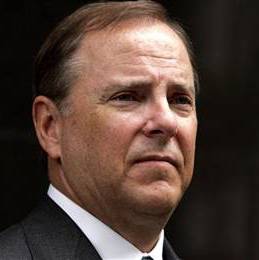 Former Enron CEO Jeff Skilling’s sentencing hearing is Monday afternoon, so it’s a good time to provide some links that will provide a basis for an objective evaluation of Skilling’s case as a counterbalance to what the mainstream media typically serves up.
Former Enron CEO Jeff Skilling’s sentencing hearing is Monday afternoon, so it’s a good time to provide some links that will provide a basis for an objective evaluation of Skilling’s case as a counterbalance to what the mainstream media typically serves up.
By now, we all know the myth — Enron was merely an elaborate financial house of cards that a massive conspiracy led by the greedy and lying Skilling and the late Enron chairman Ken Lay hid from innocent and unsuspecting investors and employees.
The Enron Myth is so thoroughly accepted that otherwise intelligent people reject any notion of ambiguity or fair-minded analysis in addressing facts and issues that call the morality play into question. The primary dynamics by which the myth is perpetuated are scapegoating and resentment, which are common themes of almost every mainstream media report on Skilling and Enron.
The power of the Enron Myth and the real presumption in the criminal case against Skilling are such that an objective jury probably could not have been found in Houston and the jurors who did serve dispensed with critical thinking skills when confronted with the biggest business conspiracy even alleged in the history of federal prosecutions.
Given the power of the Enron Myth, the jurors were content with a prosecution that cast Skilling as a liar about Photofete and his one sale of Enron stock after he left the company, and ignored the paucity of evidence of any massive conspiracy or even the true reasons why Enron collapsed.
That same view has been readily embraced by a wide-range of societal forces, such as publicity-seeking politicians who don’t allow facts to get in the way of demonizing unpopular entrepreneurs for political gain, government prosecutors who improperly expand the reach of criminal laws to further their careers, supposedly “objective” journalists who work literally hand-in-hand with the Enron Task Force or who simply perpetuate the myth in spite of the facts, competing businesspeople and lawyers seeking to profit from Enron’s demise, and a general public that finds it easy to resent wealthy businesspeople, particularly after the bursting of a stock market bubble.
The myth is so pervasive and accepted — why bother with the truth?
The carnage of the Enron Myth is now piled high — the destruction of Arthur Andersen, the death of Ken Lay, the outrageous prosecution and imprisonment of the four Merrill Lynch executives in the Nigerian Barge case, Richard Causey, Kevin Howard, Christopher Calger, the NatWest Three — the list goes on and on. In the wake of such destruction of careers and lives, the public is even less willing to confront the vacuity of the myth and the destructive dynamics by which it is perpetrated.
In fact, any challenge to the myth is now commonly met with derision and appeals to even more resentment over the Enron failure.
As has been chronicled on this blog, it is far more likely that the truth about Enron is that no massive conspiracy existed, that Skilling and Lay were not intending to mislead anyone and that the company was simply a highly-leveraged, trust-based business with a relatively low credit rating and a booming trading operation.
Although there is nothing inherently wrong with such a business model, it turned out it to be the wrong one to survive amidst choppy post-bubble, post-9/11 market conditions when the markets were spooked by revelations of the embezzlement of millions of dollars by the company’s CFO and his relative few minions.
That Jeff Skilling did not predict that Enron would fail under those conditions does not make him a criminal. Unlike his main accusers Andy Fastow and Ben Glisan, Skilling didn’t embezzle a dime from Enron.
Did he tirelessly advocate this highly-leveraged but innovative company that was dealing with difficult post-bubble market conditions during 2001? Sure, but since when is it a crime for a CEO to be optimistic — even overly-optimistic — about his company?
Beyond the shattered lives and families, the real tragedy here is that the demonization of Skilling has distracted us from examining the tougher issues of what really caused Enron’s demise and understanding the how such a company can be structured to survive in even the worst market conditions.
It’s a lot easier just to throw a good and decent man such as Jeff Skilling in jail and throw away the keys, but examining objectively what really occurred at Enron is far more likely to result in real justice.
Here are some links to prepare you for the Skilling sentencing hearing:
Peter Henning analyzes the Skilling sentencing issues here, while Doug Berman provides a handy archive on Enron-related sentencing issues;
The trial penalty issue in the Skilling sentencing is explained in this Ellen Podgor post, while this post previews the Skilling appeal issues;
Larry Ribstein places the Skilling sentencing in the perspective of the government’s purchase of testimony with pleas and questions the legitimacy of this policy;
Skilling’s fascinating testimony during his trial is summarized here and here, and
Finally, Skilling’s legacy of beneficial risk-taking, and what might have been had Ken Lay made a different decision in 1997.
